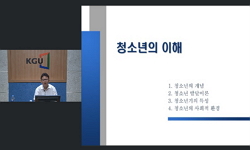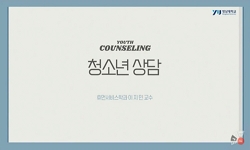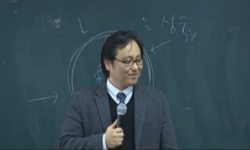The purpose of this study was to present the socialization model of adolescent's anger by analyzing the causal effect among mother's reactions to early adolescent's anger, anger management styles and problem behaviors according to the types of problem...
http://chineseinput.net/에서 pinyin(병음)방식으로 중국어를 변환할 수 있습니다.
변환된 중국어를 복사하여 사용하시면 됩니다.
- 中文 을 입력하시려면 zhongwen을 입력하시고 space를누르시면됩니다.
- 北京 을 입력하시려면 beijing을 입력하시고 space를 누르시면 됩니다.
초기 청소년의 분노에 대한 어머니의 반응, 초기 청소년의 분노관리방식 및 문제행동 간의 인과모형 분석 = The Causal Model Analysis in the Relationships among Mother's Response to Early Adolescent's Anger, Anger Management Styles and Problem Behaviors
한글로보기부가정보
다국어 초록 (Multilingual Abstract)
For the purpose of this study, the hypotheses were as follows;
First, mother's anger supportive and anger rejected reactions not only have a direct effect on internalizing problem behaviors, but also have an indirect effect on them mediated by adolescent's anger management styles that are anger coping, anger-in and anger-out.
Second, mother's anger supportive and anger rejected reactions not only have a direct effect on externalizing problem behaviors, but also have an indirect effect on them mediated by adolescent's anger management styles that are anger coping and anger-out.
The subjects were 460 adolescents who were 1st and 2nd grade in middle schools in Busan. Mother's reactions to early adolescent's anger, anger management styles and problem behaviors were measured through self-reported questionnaire. To complement the limits of existing scale, questions for mother's reactions to early adolescent's anger were added and revised through the preliminary survey. Anger supportive reactions include anger acceptance and anger coping. Anger rejected reactions include anger punishing, anger override, anger neglect and anger magnifing. The data was analyzed by SPSS 23 ver. and Amos program 23.0 ver.
The major findings through this study are as follows;
First, mother's anger supportive reactions had an indirect effect on internalizing problem behaviors mediated by anger coping and anger-in. And mother's anger rejected reactions had an indirect effect on internalizing problem behaviors mediated by anger-out.
Second, mother's anger rejected reactions not only had a direct effect on externalizing problem behaviors, but also had an indirect effect them mediated by anger-out. And mother's anger supportive reactions had an indirect effect on externalizing problem behaviors mediated by anger coping.
The implication of this study is as follows;
First, this study presented an empirical basis for the socialization model of anger that reflected a discrete emotions approach. And previous studies focused on parents' reactions to negative emotions, whereas this study explored parents' reactions focusing on anger among negative emotions.
Second, the findings of this study were divided into reduction path through which mother's anger supportive reactions influences problem behaviors by anger coping and induction path through which mother's anger rejected reactions influences problem behaviors by anger-out. This suggests that mother should decrease anger rejected reactions and increase anger supportive reactions to prevent problem behaviors in conflict with adolescent children. These findings are available to present parents' role of responding to children's anger in counseling parents.
Third, the findings of this study suggest that the strategies to improve the style of anger coping are needed in the program which prevents adolescent's problem behaviors. The merit of this study is that provide intervention strategies for adolescents and parents according to the types of problem behaviors.
Forth, the advantage of this study is that parent-adolescent conflict was explored by emotional process and response of conflict focusing on not conflict frequency but parents' reactions to adolescent's anger.
The purpose of this study was to present the socialization model of adolescent's anger by analyzing the causal effect among mother's reactions to early adolescent's anger, anger management styles and problem behaviors according to the types of problem behaviors. It also provided useful data for adolescent's development of anger management styles, the guidance to problem behaviors and counseling parents.
For the purpose of this study, the hypotheses were as follows;
First, mother's anger supportive and anger rejected reactions not only have a direct effect on internalizing problem behaviors, but also have an indirect effect on them mediated by adolescent's anger management styles that are anger coping, anger-in and anger-out.
Second, mother's anger supportive and anger rejected reactions not only have a direct effect on externalizing problem behaviors, but also have an indirect effect on them mediated by adolescent's anger management styles that are anger coping and anger-out.
The subjects were 460 adolescents who were 1st and 2nd grade in middle schools in Busan. Mother's reactions to early adolescent's anger, anger management styles and problem behaviors were measured through self-reported questionnaire. To complement the limits of existing scale, questions for mother's reactions to early adolescent's anger were added and revised through the preliminary survey. Anger supportive reactions include anger acceptance and anger coping. Anger rejected reactions include anger punishing, anger override, anger neglect and anger magnifing. The data was analyzed by SPSS 23 ver. and Amos program 23.0 ver.
The major findings through this study are as follows;
First, mother's anger supportive reactions had an indirect effect on internalizing problem behaviors mediated by anger coping and anger-in. And mother's anger rejected reactions had an indirect effect on internalizing problem behaviors mediated by anger-out.
Second, mother's anger rejected reactions not only had a direct effect on externalizing problem behaviors, but also had an indirect effect them mediated by anger-out. And mother's anger supportive reactions had an indirect effect on externalizing problem behaviors mediated by anger coping.
The implication of this study is as follows;
First, this study presented an empirical basis for the socialization model of anger that reflected a discrete emotions approach. And previous studies focused on parents' reactions to negative emotions, whereas this study explored parents' reactions focusing on anger among negative emotions.
Second, the findings of this study were divided into reduction path through which mother's anger supportive reactions influences problem behaviors by anger coping and induction path through which mother's anger rejected reactions influences problem behaviors by anger-out. This suggests that mother should decrease anger rejected reactions and increase anger supportive reactions to prevent problem behaviors in conflict with adolescent children. These findings are available to present parents' role of responding to children's anger in counseling parents.
Third, the findings of this study suggest that the strategies to improve the style of anger coping are needed in the program which prevents adolescent's problem behaviors. The merit of this study is that provide intervention strategies for adolescents and parents according to the types of problem behaviors.
Forth, the advantage of this study is that parent-adolescent conflict was explored by emotional process and response of conflict focusing on not conflict frequency but parents' reactions to adolescent's anger.
목차 (Table of Contents)
- Ⅰ. 서론 1
- 1. 연구의 필요성 및 목적 1
- 2. 연구문제 8
- 3. 연구모형 9
- 4. 용어정의 11
- Ⅰ. 서론 1
- 1. 연구의 필요성 및 목적 1
- 2. 연구문제 8
- 3. 연구모형 9
- 4. 용어정의 11
- Ⅱ. 이론적 배경 13
- 제1절 문제행동 13
- 제2절 정서사회화 관점에서 본 문제행동 16
- 1. 정서사회화 모델 16
- 2. 차별적 정서사회화 19
- 제3절 청소년의 분노에 대한 어머니의 반응과 청소년의 분노관리방식 및 문제행동 간의 관계 22
- 1. 청소년의 분노에 대한 어머니의 반응과 문제행동 22
- 2. 분노에 대한 어머니의 반응과 청소년의 분노관리방식 24
- 3. 청소년의 분노관리방식과 문제행동 27
- 4. 분노에 대한 어머니의 반응과 문제행동 간의 관계에서 청소년의 분노관리방식의 매개효과 29
- Ⅲ. 연구방법 32
- 1. 연구대상 32
- 2. 연구도구 35
- 3. 연구절차 36
- 4. 자료분석 38
- Ⅳ. 연구결과 39
- 제1절 연구변인들에 대한 기초분석 39
- 1. 연구변인들의 기술통계치 39
- 2. 연구변인들 간의 상관관계 40
- 제2절 청소년의 분노에 대한 어머니의 반응과 분노관리방식 및 문제행동 간의 인과효과 42
- 1. 청소년의 내재화 문제행동에 대한 관련변인들의 인과효과 42
- 2. 청소년의 외현화 문제행동에 대한 관련변인들의 인과효과 48
- Ⅴ. 논의 및 결론 54
- 1. 논의 및 의의 54
- 2. 결론 및 제언 62
- 참고문헌 64
- 부록 83
- Abstract 93
1 이은순, "청년심리학", 서울: 학문사, 1998
2 장휘숙, "가족 심리학", 박영사, 서울: 박영사, 2008
3 정옥분, "정서발달과 정서지능", 학지사, 서울: 학지사, 2007
4 홍세희, "구조방정식 모형의 다양한 모형", 서울: 에스엔엠 리서치 그룹, 2013
5 문수백, "구조방정식모델링의 이해와 적용", 서울: 학지사, 2009
6 김귀랑, "아동의 분노표현과 또래폭력경험", 숙명여자대학교 석사학위논문, 2005
7 배병렬, "「Amos 21 구조방정식 모델링 -원리와 실제」", 청람, 서울: 청람, 2014
8 조지영, "소년원 남자청소년의 불안과 공격성의 관계", 이화여자대학교 석사학위논문, 2011
9 박은희, "부모 말을 듣지 않는 청소년의 심리과정 분석", 숙명여자대학교 일반대학원, 숙명여자대학교 석사학위논문, 1998
10 채유경, "청소년 분노표현 방식의 모델 및 조절 효과 검증", 전남대학교 대학원 박사학위논문, 2001
1 이은순, "청년심리학", 서울: 학문사, 1998
2 장휘숙, "가족 심리학", 박영사, 서울: 박영사, 2008
3 정옥분, "정서발달과 정서지능", 학지사, 서울: 학지사, 2007
4 홍세희, "구조방정식 모형의 다양한 모형", 서울: 에스엔엠 리서치 그룹, 2013
5 문수백, "구조방정식모델링의 이해와 적용", 서울: 학지사, 2009
6 김귀랑, "아동의 분노표현과 또래폭력경험", 숙명여자대학교 석사학위논문, 2005
7 배병렬, "「Amos 21 구조방정식 모델링 -원리와 실제」", 청람, 서울: 청람, 2014
8 조지영, "소년원 남자청소년의 불안과 공격성의 관계", 이화여자대학교 석사학위논문, 2011
9 박은희, "부모 말을 듣지 않는 청소년의 심리과정 분석", 숙명여자대학교 일반대학원, 숙명여자대학교 석사학위논문, 1998
10 채유경, "청소년 분노표현 방식의 모델 및 조절 효과 검증", 전남대학교 대학원 박사학위논문, 2001
11 한유진, "아동과 청소년의 우울성향 및 귀인양식과 학업성취", 서울대학교 대학원 석사학위논문, 1993
12 주지영, "고등학생의 분노표현방식,우울 및 공격성간의 관계 연구", 서울여자대학교 학생생활연구소, 서울여자대학교 학생생활환경연구, 22, 73∼95, 2009
13 고은영, "분노표현방식과 분노표현의 적절성이 우울에 미치는 영향", 가톨릭대학교 석사학위논문, 1997
14 김희숙, 이성희, "실업계 고등학생의 분노표현방식, 우울 및 공격성과의 관계", 지역사회간호학회, 지역사회간호학회지, 19(2), 2008
15 김은정, 박성하, "청소년기 애착, 대처양식, 내현화 및 외현화 문제행동의 관계", 한국심리학회, 한국심리학회 연차학술대회 논문집, 430-431, 2005
16 김은정, "아동의 분노표현 방식과 부모의 양육태도 및 심리적 가정환경", 계명대학교, 계명대학교 교육대학원 석사학위논문, 2001
17 김은정, "부정적 정서에 대한 어머니의 수용태도와 아동의 분노관리방식", 고려대학교 석사학위논문, 2010
18 서수균 ( Su Gyun Seo ), "자존감과 자기애 수준에 따른 분노사고, 신념, 분노표현의 차이", 韓國心理學會 相談心理 및 心理治療學會, 한국심리학회지: 상담 및 심리치료, 19(3), 719-734, 2007
19 민경환, 최해연, 이동귀, "정서표현신념과 심리적 증상의 관계에서 정서표현양가성의 역할", 상담학연구, 9(3), 1063-1080, 2008
20 김희화, 이혜련, "청소년의 심리적 반발심 및 부모-자녀 갈등과 가출충동 간의 관계", 인지발달중재학회, 인지발달중재학지, 6(1), 49-67, 2015
21 신정애, "아동이 지각한 부모 교사 공감과 분노표현방식 및 공격성과의 관계", 충북대학교 교육대학원 석사학위논문, 2013
22 고미영, "정신건강센터에서 제공하는 청소년 분노 조절 소집단에 관 한 연구", 한국정신보건사회복지학회, 정신보건과 사회사업, 8, 5-22, 1999
23 박진경, "어머니의 감독 및 감독방법과 청소년의 외현화 내면화 행동 간의 관계", 이화여자대학교 대학원 석사학위논문, 2001
24 윤정인, "고등학생의 분노표현방식과 사회적 지지가 심리적 부적응에 미치는 영향", 국민대학교 교육대학원 석사학위논문, 2013
25 김희화, "청소년의 문제행동 및 인터넷 비행에 대한 모감독과 심리적 통제의 영 향", 한국청소년학회, 청소년학 연구, 10(3), 2003
26 박정은, "부모의 양육태도, 공격성 및 또래동조성과 집단따돌림 가해 경향과의 관계", 서강대학교 교육대학원 석사학위논문, 2002
27 임미옥, "청소년의 분노관리방식과 심리적 부적응에 대한 사회적 지지의 중재모형연구", 청소년학연구, 19(4), 247-264, 2012
28 정윤성, "자녀가 지각한 부모의 수용-거부양육 태도에 따른 대학생의 분노관리방식의 차이", 청소년상담연구, 15(1), 91-103, 2007
29 박성아, "대학생이 지각한 부모와의 의사소통유형과 양육태도가 분노 표현방식에 미치는 영향", 동아대학교 대학원, 동아대학교 대학원 석사학위논문, 2010
30 박서정, "어머니의 정서사회화 행동과 학령기 아동의 정서조절 전략 및 정서 조절 능력 간의 관계", 성균관대학교, 성균관대학교 대학원 박사학위논문, 2004
31 정윤경 ( Yoon Kyung Jeong ), 노지영 ( Jee Young Noh ), "자녀의 부정적 정서표현에 대한 어머니 반응에 따른 아동의 정서표현양가성과 정서표현신념", 한국심리학회, 한국심리학회지: 발달, 23(2), 57-71, 2010
32 이동훈, 이혜림, "한부모가정 아동의 역기능적 분노표현 방식이 우울과 외현화 문제행동 에 미치는 영향: 가족기능성의 조절효과를 중심으로", 한국교육학회, 교육학연구, 54(1), 2016













